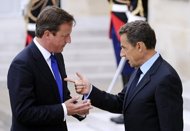Britain and France to sign nuclear power deal at summit

France and Britain have often clashed recently over economic policy in the eurozone, an area in which Paris is much closer to Berlin, but they are still close partners in defence and now plan to share nuclear expertise.
Germany has decided to phase out nuclear power, but France still uses it to generate around three-quarters of its power and is keen to seize the market for the world's next generation of more powerful reactor technology.
"At our last summit, we signed a historic partnership on defence. Today, we will match that ambition on nuclear energy," Cameron said, in remarks released by Downing Street before he left London for Friday's talks in Paris.
"As two great civil nuclear nations, we will combine our expertise to strengthen industrial partnership, improve nuclear safety and create jobs at home. The deals signed today will create more than 1,500 jobs in the UK."
French nuclear giant Areva is pioneering development of the modern EPR reactor, but Cameron said that thanks to the agreement, British firms would make "the vast majority of the content of our new nuclear plants".
Downing Street said that, under the deal, the British engineering firm Rolls-Royce will secure a £400 million (481 million euro, $632 dollar) share in the work build Britain's first EPR at Hinkley Point in southern England.
Other British firms will sign deals worth a total of £115 million with France's state-owned energy giant EDF as part of the Hinkley project.
France and Britain will also work more closely on training and safety technology in order to ensure that the next generation of reactors are safe.
Renewed safety fears in the wake of last year's Fukushima nuclear disaster in Japan contributed to German Chancellor Angela Merkel's decision that the EU's biggest economy would begin to phase out nuclear power by 2022.
But France, which generates 75 per cent of its power in reactors remains committed to the technology, and Sarkozy has made bashing an opposition plan to gradually reduce this proportion a key part of his re-election drive.
Both Downing Street and the Elysee Palace said Friday's summit would also tackle the crisis in Syria and the broader question of Franco-British defence cooperation following their close collaboration in the Libyan campaign.
"One year on from the Libya uprising, we are working together to stand up to the murderous Syrian regime and to stop a nuclear weapon in the hands of Iran," Cameron said, in the same pre-summit statement.
On the diplomatic front, France and Britain will press for a stronger UN Security Council position on Bashar al-Assad's vicious crackdown on a popular revolt, despite Russian and Chinese opposition to outside intervention.
And on the question of practical military cooperation, the NATO partners plan to review progress on a year-old defence agreement that will see them pooling more resources and technology, especially in naval forces.
According to reports in France, the partners are due to take another step towards building a European armed drone -- an un-manned bomber and spy plane that would be a joint project between France's Dassault and Britain's BAE.
Cameron was due to arrive in Paris shortly before midday (1100 GMT), hold talks and a joint news conference at the Elysee followed by a working lunch.
What the stars mean:
★ Poor ★ ★ Promising ★★★ Good ★★★★ Very good ★★★★★ Exceptional
Related Contents
Latest News
More News
- Foreign leaders extend congratulations to Party General Secretary To Lam (January 25, 2026 | 10:01)
- Russian President congratulates Vietnamese Party leader during phone talks (January 25, 2026 | 09:58)
- Worldwide congratulations underscore confidence in Vietnam’s 14th Party Congress (January 23, 2026 | 09:02)
- Political parties, organisations, int’l friends send congratulations to 14th National Party Congress (January 22, 2026 | 09:33)
- 14th National Party Congress: Japanese media highlight Vietnam’s growth targets (January 21, 2026 | 09:46)
- 14th National Party Congress: Driving force for Vietnam to continue renewal, innovation, breakthroughs (January 21, 2026 | 09:42)
- Vietnam remains spiritual support for progressive forces: Colombian party leader (January 21, 2026 | 08:00)
- Int'l media provides large coverage of 14th National Party Congress's first working day (January 20, 2026 | 09:09)
- Vietnamese firms win top honours at ASEAN Digital Awards (January 16, 2026 | 16:45)
- ASEAN Digital Ministers' Meeting opens in Hanoi (January 15, 2026 | 15:33)

 Tag:
Tag:




















 Mobile Version
Mobile Version